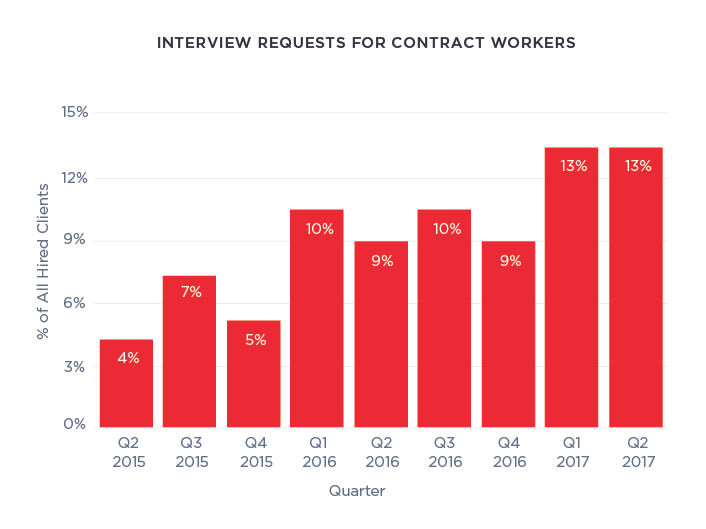
Hired Data Report: Technical Talent Contract Work is Here to Stay
At Hired, we don’t just want to help everyone find a job best suited to their talents — we want to help them to find a position that fits their lifestyle. The perception today is that full-time technical employees feel chained to their desks, envying the freedom offered to contract workers; and that contract workers reciprocate those feelings, pining after collaborative teammates and the steady income associated with a full-time gig.
But data from Hired on the millions of candidates looking for technical jobs (e.g. software engineering, data science, product management and more) reveals that the difference is not black-and-white. Our Global Flex Report: State of Contract Work offers insight into contingent workers and the organizations that rely on them. Here’s what we found.
Companies Want Contract WorkersWith 20% of US-based candidates and 21% of UK-based candidates on Hired interested in contract work, companies are reciprocating their interest. In the last two years, interview requests for technical contract workers has more than tripled — jumping from 4% in 2015 to 13% in 2017.

It’s good news for the contract talent, too, because companies are willing to pay for experienced candidates. As a base rate, companies pay these contractors about $71 per hour in the US, and $45 per hour in the UK. Those in the US with more than 15 years of experience, however, are offered about $28 more per hour than technical contractors with 4-6 years of experience — a difference of $58,240 annually when adjusted for a 40-hour work week.
Location mattersLocation makes a difference for competitive wages, too. Though the cost of living in the San Francisco Bay Area is one of the highest in the country, the hourly contract wages offered for technical talent are high to match. Companies based in the Bay Area pay about $105 per hour, with Seattle companies coming in second at $97 per hour. Across the world, London rates average $70 per hour, matching the wages offered in San Diego.

The data also reveals another benefit of contracting: contractors aren’t limited to the opportunities in their neighborhood. Although technical contractors in Austin are earning about $25 less per hour than their Silicon Valley colleagues, the cheaper cost of living is paying off. An Austin-based contractor with a full-time gig makes about $141,440 — whereas to live a comparable lifestyle in San Francisco, a contractor would need to make $260,227 annually. A similar difference exists between San Francisco and Los Angeles, where an LA-based engineer would need to earn another $40K per year to maintain their lifestyle in the Bay Area.
Most contract workers choose flexibility over earningsThe flexible hours, vacation time, and project-based workload set contract workers apart from their 9-to-5 counterparts — and many think these workers cash in on those benefits while missing out on a high salary. But for tech contractors on the Hired platform, that’s not the case.
In the US, a 1099 technical contractor working 40 hours per week is paid an average of $147,680 annually — a full $24,918 more than a full-time W-2 employee working the same number of hours for an average $122,762 salary. Considering that many tech workers work more than 40 hours a week, paid-by-the-hour contractors are enjoying the benefits of working a standard work week while still getting higher pay. However, most contractors don’t ever see that $24K extra in their bank accounts; and that’s by choice. The average contractor works about 22 hours/week on their assignments — not 40 — showing that the flexibility offered by contract work can be more appealing than taking on more projects for more money.
Everything from mobile technology capabilities to a widespread desire for a better work-life balance has contributed to an increase in this new kind of employment landscape. Companies and employees alike are benefiting from the workplace shift that makes technical contract work a standard part of many businesses, because it enables choice and flexibility — suggesting that contract work is here to stay.
For more insights, check out the full Global Flex Report by clicking below.


